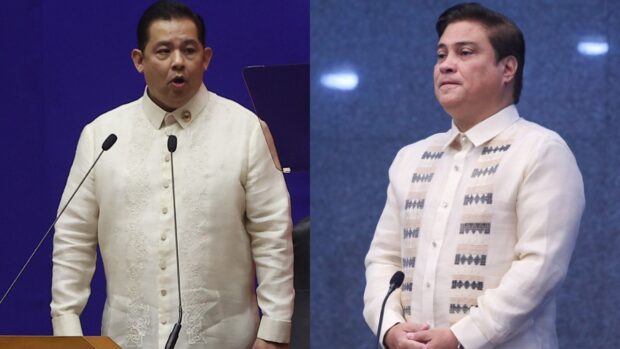
House Speaker Martin Romualdez and Senate President Juan Miguel Zubiri. (File photos by NIÑO JESUS ORBETA / Philippine Daily Inquirer and the Senate Public Relations and Information Bureau)
MANILA, Philippines — The leadership of the House of Representatives signaled to the business community its continued focus on forging more public-private sector partnerships (PPPs) and using the newly established Maharlika Investment Fund (MIF) as drivers of economic growth.
At the Senate, the head of the chamber vowed to keep it a “safe civic space” for fiscalizing and oversight even with a current composition where, like in the House, opposition figures are vastly outnumbered.
As they resumed their regular session on Monday morning, lawmakers set these immediate targets and reasserted roles hours ahead of President Ferdinand Marcos Jr.’s second State of the Nation Address (Sona).
Speaker Martin Romualdez said the House would prioritize the strengthening of PPPs for infrastructure projects, saying this approach can “harness the expertise, innovation, and resources of the private sector and combine it with the reach, stability and public purpose of the government.”
He cited transportation, energy, and digital innovation as the sectors where PPPs would be pursued.
The House, he said, recognizes the importance of assuring foreign companies that “investor-friendly policies” are in place in the Philippines.
Removing obstacles
“We are dedicated to enacting laws that will remove obstacles, foster innovation, and support industries that have the potential to drive sustainable growth and development,” Romualdez said in a speech marking the reopening of the session.
As for the MIF, Romualdez said: “We renew our dedication and passion, honoring our pledge to amplify investment prospects for domestic and foreign investors through the MIF and other initiatives aimed at accelerating our nation’s development.”
The MIF law setting up the sovereign wealth fund was fraught with controversy when introduced and speedily passed by the House in December last year, approved by the Senate in May and signed by Mr. Marcos on July 18. Before reaching its final form, among the earliest questions to hound it was on the proposed use of state pension funds for its capitalization.
The Speaker earlier reported that the Japan Bank for International Cooperation and several American firms had expressed interest in investing in the P500-billion MIF.
3 target bills this year
The chamber, Romualdez said, would also work on the passage within the year of three remaining measures that the Palace had marked as priorities.
These are the draft Unified System of Separation, Retirement and Pension for Military and Uniformed Personnel Act, the National Employment Recovery Strategy, and an amendment to the Anti-Agricultural Smuggling Act.
“We face the remaining bills in the Ledac (Legislative-Executive Development Advisory Council) priority list with enthusiasm and optimism, steadfast in our determination to transform these initiatives into concrete laws,” he said.
‘Against the wind’
At the Senate, preserving the chamber’s independence dominated the theme of Senate President Juan Miguel Zubiri as he reopened the session. But he also shared the view that laws of major consequence “do not trend or scream headlines.”
“The Senate will remain a safe civic space where anyone can come to market his or her views,” Zubiri said. “We will debate because a legislature which no longer does ceases to be the country’s highest deliberative body.”
“We will keep the faith in an independent Senate, but with independence comes the grit to make hard decisions… We will sail against the wind, so to speak, even meeting headlong the gust of public opinion and to stay the course for as long as we know that we are right.”
The Senate deliberations “should not be dictated by any political weather vane,” he stressed. “When we exercise our oversight powers, we do so to primarily correct laws. If, however, in the process it sends culprits to [jail], then it is a welcome bonus.”
“The fact is, most important pieces of legislation do not trend nor scream headlines. But at the end of the day, these proposals are what the country needs.”
‘Vigilant opposition’
Zubiri acknowledged the only two minority voices in the 24-member body—Senators Aquilino Pimentel III and Risa Hontiveros—saying they make up “a vigilant opposition who do not obstruct but critique constructively, their inputs resulting in better laws.”
Pimentel and Hontiveros thanked Zubiri for the recognition.
“But I also told him, ‘Let’s do what you just mentioned.’ We should never cut the time of the minority when we want to interpellate,” Pimentel said in an Inquirer interview, recalling how Marcos allies in the chamber had blocked his and Hontiveros’ efforts to continue plenary debates on the MIF.
Zubiri said the Senate and Malacañang may not always see eye to eye. “[The President’s] take on things may differ with us. His can be rosy; ours can be restrained. Or in certain issues, we may be upbeat, as he will be subdued.”